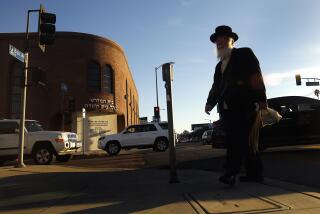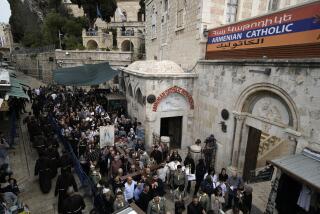Commentaries Soften Role of Jews in Passion Reading
- Share via
The Good Friday liturgy for Roman Catholic churches around the world draws upon the Gospel of John, which has especially provocative scenes of Jewish crowds calling for the crucifixion of Jesus.
In parishes of the Los Angeles archdiocese next Friday, as in the last several years, a commentary will be read by the priest before the Passion reading to soften the emotional impact. It reads in part:
“The hostility between the earliest of Christians and their Jewish brothers and sisters, as manifested in the Gospel of John, cannot be continued today. The timeless message of reconciliation and love for all humanity has to replace early Christians’ prejudice against their Jewish contemporaries before Jesus’ work will ever truly be finished.”
The archdiocese was recently praised by national leaders in Catholic-Jewish relations for writing such commentaries for Lenten liturgies in efforts to put to rest the centuries-old charge that Jewish people as a whole were responsible for the death of Jesus.
Drama Overpowers the Word
But more needs to be done, says the Los Angeles priest-rabbi committee that worked out those guidelines eight years ago.
“The power of the drama sometimes overpowers the word,” said Msgr. Royale Vadakin, the chairman of the archdiocesan Commission on Ecumenical and Interreligious Affairs.
Vadakin said the priest-rabbi committee, which explored some options in a forum last week, will consider proposing additional commentaries to be read within the Good Friday narration in parishes. He said the committee is also concerned about popular re-enactments of the Passion story outside of church walls, especially popular in Latino parishes, which do not have to follow precise liturgical guidelines.
“Our desire is not to intrude on the ethnic richness of these productions but to assure that the proper perspective of the Second Vatican Council is integrated into that,” said Vadakin, interviewed at St. Vibiana Cathedral, where he serves as pastor.
Change in Perspective
The 20th anniversary of the Vatican II Declaration on non-Christian religions was recently observed jointly by the American Jewish Committee and the archdiocese. Rabbi A. James Rudin, the AJC national director for interreligious affairs, said the document’s call for respect for Judaism and Jewish people and the events of the last 20 years “one of the great turnarounds in history.”
Rudin said the result has meant that “Catholics no longer view Jews as candidates for conversion, and Jews no longer view the Roman Catholic Church as the great adversary.”
The New York-based rabbi said the Los Angeles experiment “is very, very important because you are very advanced (in Catholic-Jewish sensitivity).”
Father John Pawlikowski, agreed with Rudin that Jewish-Catholic relationships have progressed remarkably. But he also agreed with the Los Angeles priest-rabbi committee that New Testament readings almost inevitably can leave the impression that Jesus was alone “against the totality of the Jewish community.”
Every third year, the Gospel of Matthew’s Passion account is used for church readings on Palm Sunday. In the Los Angeles parishes, an introductory commentary is read to soften the impact of the cry coming from Jewish people at the Temple, “Let his blood be on us and our children.”
Can’t Blame Jewish People
The remarks of the priest add: “We cannot make the mistake of blaming the whole Jewish people--33 A.D. or today--for Jesus’ death. Since we sin, the cry ‘crucify him’ is our cry. Ours too is the opportunity of Joseph of Arimathea and the women at the tomb: to be among those trusting in God is rewarded by experiencing the powerful presence of the risen Jesus in our lives.”
The committee’s immediate attention will be turned to the annual Good Friday readings of the Gospel of John although no changes will be made for next week’s liturgy, Vadakin said.
Rabbi Paul Dubin, a member of the Los Angeles joint committee, said he and other rabbis agree that the text of Scripture should not be changed.
The clergy will consider additional commentaries to be interspersed throughout the liturgy to remind parishioners of their own sins and “not to remain hostile toward our Jewish brothers and sisters today.”
More to Read
Sign up for Essential California
The most important California stories and recommendations in your inbox every morning.
You may occasionally receive promotional content from the Los Angeles Times.










